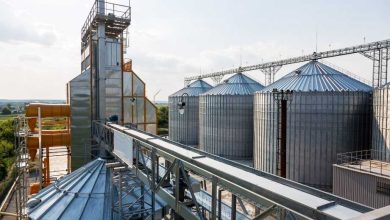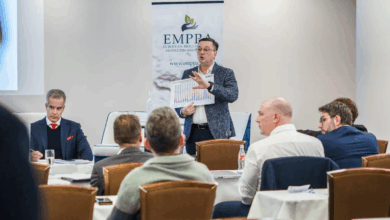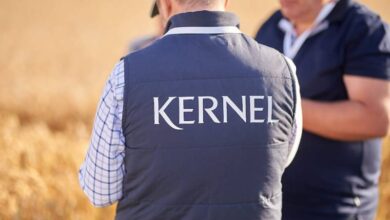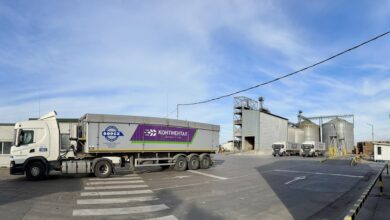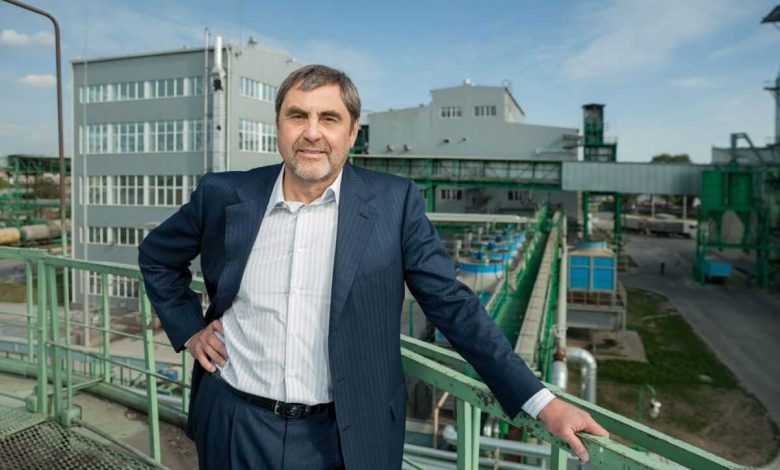
In 2014–2015 marketing year, ViOil’s EBITDA increased 35% to $ 72.7 million and revenues reached $ 373.8 million. «Ponomarchuk has built one of the most modern and powerful complexes in the country, which can increase its production to 2,800 tons of oilseeds per day», says Stepan Kapshuk, CEO at Ukroliyaprom Association. This is the most powerful enterprise in the industry in terms of processing capacity at a single site.
Ponomarchuk is not involved in micro-management, but he is well aware of the situation at the factory. «Victor arrives to the factory several times a month and never misses a single detail», says Alla Vlasyuk, ViOil’s Chief Financial Officer. The businessman neither likes to sit around himself nor allows this to his employees. «It is not easy to keep up with his pace», says one of them.
At 9.00 AM, when we got to the factory with our photographer, Ponomarchuk was already in the office and apparently had already resolved several important issues. After the meeting with his top managers, which was scheduled for this time, he, several directors and the Landlord editor went to inspect the factory. Our small group could hardly keep up with him. Nobody made any special preparations for our visit, but the huge territory of the plant was clean. Flocks of birds circling in the sky strove to get into the room with sunflower seeds. «Birds know us well», says Vlasyuk jokingly. Rhythmically buzzing crushing machines do not stop even at night — the company operates in three shifts. «Perhaps twenty years ago, when you bought a dilapidated factory, you could not imagine that it will become such a powerful modern enterprise», I asked Ponomarchuk. «You’d hardly imagine how it looked like,’ smiled the businessman. «We started with laying concrete slabs on the street, because there was no pavement at all. And when it rained, everything around turned into impassable mud». After giving a short glanced at his watch, Ponomarchuk hurries to the next meeting with the sales department. «In the evening I have to go back to Kiev, so today I have a lot to do», explains the businessman. We were lucky enough to witness how a millionaire handles all his business and crosses out the executed tasks one by one in his diary. In between meetings, inspections and other items of the mandatory program, Ponomarchuk readily told us stories occurred during many years of his business practice.
LL: Sunflower oil is one of the most profitable segments in agribusiness today. You mastered this industry since the 1990s. How could you see its potential at that time?
In the 1990s, I explored all the promising areas including agriculture. When we bought our fat and oil companies — Vinnitsa and Chernovtsy factories — they were both insolvent. Labor collectives, who owned these oil-extracting factories, used old management methods and made gross commercial mistakes. It was a time of hyperinflation, and it was necessary to be very careful. Of course, the situation in the agricultural sector was different as compared to nowadays. In the 1990s, Ukraine produced less than 100,000 tons of rapeseed of extremely low quality, which could not be exported. We were the first in Ukraine to begin processing low-grade rapeseed for technical purposes, and generated demand for rapeseed. And then we brought a large batch of high-quality French seeds with low erucic acid content, and distributed it free of charge among farmers. We knew that it is a chance to work for export. We felt the prospects, although it was very difficult.
LL: This means that even then you understood that the global demand for vegetable oils would increase.
The growing demand for vegetable oils is connected with the economic development of India, China and the Middle East. Over the past 25 years, China’s GDP increased tenfold, and this leads to a change in the quality of food. Agricultural products are not produced in high volumes in many countries with large population. Ukraine has been using its strategic advantages actively for a decade now, and therefore this country took leading position in the sunflower oil market. One third of vegetable oils in the world are represented by palm oil, another one third is soy oil, and the rest is rapeseed and sunflower oil. Olive oil occupies a very small market share; there are no big manufacturers in this segment. These small oil makers are connected to specific trees that grow for thousands years. We compete with palm oil manufacturers. In developing countries, it is used to make food products. This oil is mainly used in the production of confectionery fats and margarine throughout the world. It is not easy to push out the palm oil from the market, because it is a very big business, and the cost is relatively low. During the last three or four years Ukraine has strengthened its position in the production of soybeans and rape. Rape is the main oilseed in the European Union, which is the largest consumer and producer of the seeds. Rapeseed oil is used both in food and in biodiesel industry. The world’s largest rapeseed producer and exporter is Canada. Ukraine exports rapeseed and soybean as raw material, but we need to increase their processing.
LL: Our country has been the world’s leading exporter of sunflower oil for several years now. And every year we built new oil extraction plants. Will there be enough raw materials in Ukraine to load all the existing facilities?
No. All businesses will face this problem. Therefore, the processing companies need to be given certain preferences. Now they buy sunflower seeds at global prices. The processors’ margin is low. In the situation of raw material shortage we’ve secured some room for maneuver. Our business model is based on processing of three types of oilseeds: sunflower, rapeseed and soybean. So we can load facilities by 100%. Another part of the purchased raw materials will be given to other plants under the tolling scheme. In terms of processing, we are now in the second place after Kernel company owned by Andrew Verevsky. Creative Company, which was number two in the Ukrainian market, is experiencing difficulties due to debt repayment problems and the change of owner. Cargill lost its plant in Donetsk because of the military conflict in Eastern Ukraine.
Your company is the leader in this country in terms of the production of rapeseed oil. But you produce small volumes now: you process about 100,000 tons of rapeseed a year. Are you going to increase the rapeseed oil production this season?
The processing of rape will remain at the same level as last year in our company. There will be a certain decline in oilseeds production next year because of drought during the planting period. We shall start soybean processing in winter. We will export the processed products of this crop, which is new to Ukraine. However, soy is used mostly not for oil production; it is extraction cakes as a raw material for the compound feed industry. We will sell it both in the domestic and foreign markets.
LL: What will happen to global prices for vegetable oils today, when the petroleum prices fell by almost half over the last year and they are closely connected?
It is very difficult to predict what will happen to vegetable oil prices. They are influenced by petroleum quotations and the crop yield in major producing regions. This year, the sunflower yield will be a record one in Ukraine. Growing prices for any kind of oilseeds affects all other oilseeds, because they are partially interchangeable.
LL: In 2006, you parted with your partners in KMT where you worked together for about ten years. They remained with the development business, and you got two oil extraction plants. Was this business separation difficult for you?
The situation with our partners was very difficult. I did not want to split the company. I had a controlling share in KMT, but the partners did not believe in the oil processing prospects. The separation has thrown ViOil back for many years. It is not easy to manage oil and fat business. Construction seemed a more stable business to them. Other factors also influenced this decision. Everyone wanted to manage the business his own style, and sometimes these styles did not fit together.
LL: What kind of management style is better for you?
In some cases I can be too high-toned and tough, and in some cases I am democratic. The whole team should strive for to the end result. It is impossible to distribute future profits; only actual revenues can be distributed. Many businesses failed because they counted their chickens before they were hatched. Working for the end result is a long way. Everyone wants to get a quick return.
LL: What rules helped you to become a successful businessman?
One of the rules is to build a business that will work better tomorrow than today. This means moving forward and fighting for results. The second rule is considering an issue thoroughly. Sometimes a great idea fails because of insufficient attention paid to the details and nuances. The third thing — it is necessary to delegate responsibilities and the authority. If the owner is always focused on everyday operations, he or she will never build a big business. Everything will be limited by his physical abilities. Finally, the team is the key thing. I always learn here, including learning on my own mistakes. People can be the biggest disappointment. A person can disappoint you for various reasons. He might be a professional but have excessive ambitions or the lack of ability work in team. I like creative people. One of my best qualities, as I see it, is the ability to listen and to hear good ideas. It helps in business a lot. Most good ideas have been brought by some of my managers.
LL: What do you never forgive your team members?
I’ll never forgive betrayal. Not me personally, but the whole idea of the business. A person can work for a kickback. The harm caused by his personal interest can be ten times bigger than the prize he receives. Stealing is the least loss compared to what a business can lose. Such people are surely demotivated; they are targeted for completely different goals. People can reach an agreement, they contribute their efforts to the final result but the team should be focused on the same goal.
What HR motivation system do you prefer?
Our motivation is very clear. When the goal is achieved, it is important that everyone receives its bonus. The calculation should be very accurate here. Our top managers get bonuses every six months.
Are you always cautious about borrowed funds? The company has never had big debts. Is it also one of your rules?
It is impossible to survive without borrowed funds in this business. But there is the golden mean, and one should always feel it. Loan funds are effective in the emerging markets, but in crisis, debts often become a heavy burden for companies. Debt to revenue never exceeds 0.3 in ViOil. We work with all major banks operating in Ukraine. We have a good reputation and never let anyone down. We do not work with governmental banks now, because they are highly dependent on policy. Many of my friends, who run their own business, suffered because of them.
In mid-2000s, your colleagues in the oil and fat business were active in the stock market. For example, in 2007 Kernel successfully went public on the Warsaw Stock Exchange and generated $221 million, and Creative attracted $30 million as a result of a private placement. You also tried to attract external funding several times, but each time halted this decision. Why is that?
Companies that went public before 2008 benefited most. They entered the crisis with better financial resources. Our model was more conservative. In 2008, we considered the opportunity of private placement and even negotiated with two American investment funds, but in September the crisis erupted in Ukraine, and the deal was cancelled. Another attempt to place shares in the stock exchange was made by the company in summer 2011. We had planned IPO in the Warsaw Stock Exchange, but the situation was not favorable. A week before the placemen Kernel, a company with good bottom line, fell almost 20%.
LL: What do you think is your main role in the company?
Proper strategic decision making and the identification of problems in all managerial areas: HR and manufacturing (i.e. all forms of audit — technical, financial, etc.). This is the basis for decision making. We changed the concept of Vinnytsia oil and fat factory the last moment, despite the fact that the company has already purchased the equipment. If we implemented the first concept, it would turn out to be a big mistake. That model of our development was more conservative, it implied less facilities.
Risk management is also important. You can build a nice expensive factory, but you will not have enough working capital to ensure its operation at a full capacity. Some players have already made this mistake.
LL: You were a student of an art school in your childhood and even earned your first money by making mosaic pictures with your friends during school vacations. Do you often take a pencil in your hands now?
I did all these things in my previous life. At school I was forced to make wall newspapers and this turned me out of drawing forever. But I understand art and visit art galleries with pleasure. This is what the Vinnitsa art school left me. In the 1980s, I liked science, and I use much of that knowledge and skills today in my business.
Text: Irina Chukhleb



